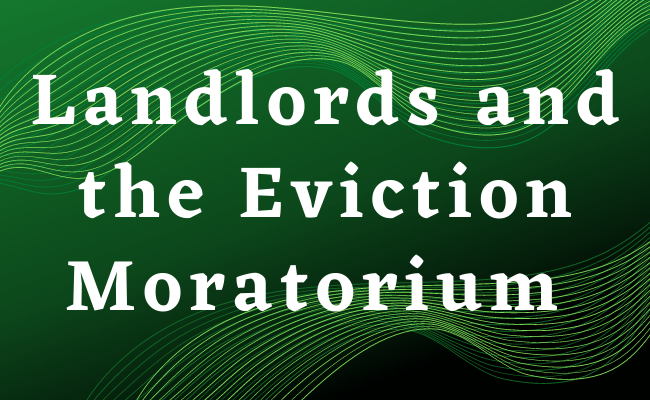Landlords and the Eviction Moratorium
The CDC eviction moratorium guidelines are still in place until December 31, 2020. During this COVID-19 pandemic, landlords have two big possible problems:
- Tenants who can’t pay the rent.
- Tax losses they can’t deduct.
We’ll start with the tenants and then move on to the rental property tax-loss issues.
Residential landlords are subject to a sweeping nationwide federal moratorium on evictions for nonpayment of rent through the end of 2020, due to the impact COVID-19 has had on the economy.
However, there is no moratorium on landlords’ responsibility to pay their bills.
The Federal Moratorium on Residential Evictions
The CDC issued the latest federal moratorium effective September 4, 2020, through December 31, 2020, the CDC order generally bars residential landlords from evicting tenants for nonpayment of rent if a tenant’s estimated 2020 income is no more than $99,000 (single) or $198,000 (married, filing jointly).
The order applies to all types of residential rentals. There is no requirement that the rental be federally financed or rent subsidized. To prevent an eviction, a tenant need only give the landlord a declaration signed under penalty of perjury providing that the tenant can not make payments.
The kicker is, tenants do not need to provide their landlord with any proof that the statements in the declaration are true.

Here is what your tenant needs to qualify under this new CDC order:
- Has used their best efforts to obtain all available government assistance for rent or housing
- Falls within the income restrictions ($99,000 or $198,000 in income for 2020)
- Is unable to pay the full rent due to substantial loss of household income, loss of work or wages, or extraordinary out-of-pocket medical expenses
- Is using his or her best efforts to make partial payments that are as close to the full rental payments as the tenant’s circumstances permit
- Would likely become homeless or forced to move into and live in close quarters or a shared living space
The CDC has created a form declaration for tenants to use. There is no time limit on when tenants must provide this declaration to their landlord—they can do so anytime before or after receiving a termination notice.
Landlords this is the real gist of this article: Individual landlords who violate the CDC order are subject to a fine of up to $100,000 and up to one year in jail, if the violation does not result in a death. The fine goes up to $250,000 if the violation results in a death (it’s unclear how the government could prove an eviction caused a tenant’s death).
The fines are doubled for organizations such as LLCs, corporations, and REITs.
Help Them Help You
The CDC order requires tenants to seek government aid to help pay their rent. But they need not seek help from non government sources such as churches or private charities.
Since it is to your advantage (sounds a little cold I know but this is the reality we are living in) below is a link to government programs providing financial assistance for renters are available at https://legalfaq.org.
Work Out a Payment Plan
Try to work out payment plans with struggling tenants. This is in their best interests as well as your own. Be sure to get the terms in writing. this is the only way to protect yourself and your investment.
You are under no obligation to offer a tenant a permanent rent reduction or any form of rent forgiveness. Keep in mind the government is not going to reward your generosity. This doesn’t mean you shouldn’t do it. It also means, you get no tax deduction or other tax benefit for reducing or forgiving rent.
Unpaid Rent Is Not Tax-Deductible
Bad news. Unpaid rent is not a tax-deductible rental expense. Rather, it is a debt owed to you by your tenant. You get no tax deduction for the unpaid rent even if tenants never pay the rent they owe.
Good news. Unpaid rent is not taxable as income, is not reported on your tax return, and increases the chances that you will have a rental property tax loss (deductible, we hope).
Deducting Rental Property Tax Losses
You have a rental loss if the total annual expenses you incur for your rentals exceed your total rental income. Rental losses are always classified as passive losses. Subject to two important exceptions, the general rules are as follows:
- Passive losses are deductible only from passive income.
- Passive losses are not deductible either
- From ordinary income such as salary and self-employment earnings
- From investment income such as dividends or interest.
Exception 1. $25,000 Allowance for Rental Real Estate: If your MAGI for the year is under $100,000, you may deduct up to $25,000 in total annual rental losses from your non-passive income, provided that you actively participate in the management of your rentals (an easy standard to meet).
Exception 2. Real Estate Professional Exemption from Passive Loss Rules: If you qualify as a real estate professional and materially participate in your rental activity, you may treat rental losses as non-passive and deduct them from all other non-passive income without limit for 2020.
Non-deductible Rental Losses Become Suspended Passive Losses
You don’t lose rental losses you can’t deduct because of the passive loss rules. Instead, the losses become suspended passive losses. They are carried forward indefinitely and deducted from passive income each year until they are used up. You may also deduct your suspended passive losses if you sell or otherwise dispose of substantially all your interest in your rental property in a taxable transaction.
For more information, this article and many more to help your business grow are on our website cdprofessionalservices.com




